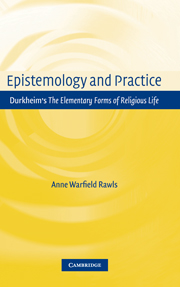Book contents
- Frontmatter
- Contents
- Acknowledgments
- Introduction
- 1 Durkheim's Outline of the Argument in the Introductory Chapter
- 2 Durkheim's Dualism: an Anti-Kantian, Anti-Rationalist Position
- 3 Sacred and Profane: the First Classification
- 4 Totemism and the Problem of Individualism
- 5 The Origin of Moral Force
- 6 The Primacy of Rites in the Origin of Causality
- 7 Imitative Rites and the Category of Causality
- 8 The Category of Causality
- 9 Logic, Language and Science
- 10 Durkheim's Conclusion Section iv: Logical Argument for Social Origin of the Categories
- Conclusion
- Bibliography
- Index
6 - The Primacy of Rites in the Origin of Causality
Published online by Cambridge University Press: 22 September 2009
- Frontmatter
- Contents
- Acknowledgments
- Introduction
- 1 Durkheim's Outline of the Argument in the Introductory Chapter
- 2 Durkheim's Dualism: an Anti-Kantian, Anti-Rationalist Position
- 3 Sacred and Profane: the First Classification
- 4 Totemism and the Problem of Individualism
- 5 The Origin of Moral Force
- 6 The Primacy of Rites in the Origin of Causality
- 7 Imitative Rites and the Category of Causality
- 8 The Category of Causality
- 9 Logic, Language and Science
- 10 Durkheim's Conclusion Section iv: Logical Argument for Social Origin of the Categories
- Conclusion
- Bibliography
- Index
Summary
While the title of Book III is “The Rites,” the primary task of Book III is to establish the social origin of the category of causality. There is no contradiction here, as the argument for causality constitutes the central demonstration that rites precede and cause beliefs, or more fundamentally that rites cause the categories of reason. It is the experience of the moral force of that creation; of the necessity involved, that constitutes the category of causality.
Before proceeding to a discussion of the origin of causality in enacted practices, however, Durkheim first begins to establish the process through which religious rites can cause collective ideas in their participants. He wants to establish that in principle treating rites as the cause of empirically valid beliefs is not subject to certain obvious problems before unveiling his own argument. It is a slow and cautious approach, typical of Durkheim, which leaves the important argument for the categories deeply embedded in the text. Because of the length of the argument, the variety of counter arguments Durkheim considers and empirical presentations he makes, the argument for causality will be analyzed in three distinct parts over the next three chapters.
The first two chapters of Book III, which look like a survey of types of religious rites, in actuality constitute a demonstration of the importance of various rites in relationship to the generation of the sacred. Negative rites protect the sacred while positive rites, according to Durkheim, actually create sacred things.
- Type
- Chapter
- Information
- Epistemology and PracticeDurkheim's The Elementary Forms of Religious Life, pp. 194 - 211Publisher: Cambridge University PressPrint publication year: 2005



